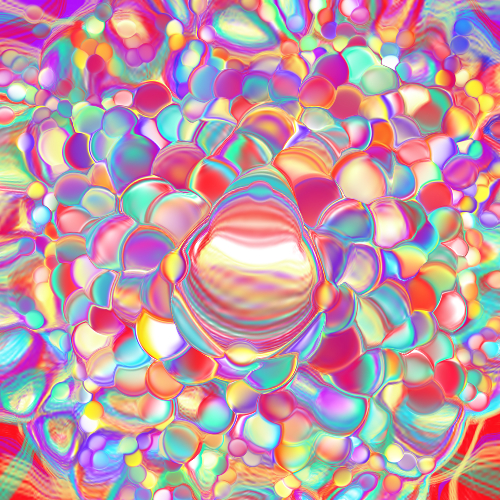“Who is Krishna?” - Part One
Arjuna seeing the Vision of the Cosmic Form is moved to call Krishna by the name of the benevolent deity Vishnu twice (XI.24 & 30). However - Vasudeva sarvam it, God is All - and as J.A.B.van Buitenen points out, Krishna in identifying with the One, the Supreme Self (Paramatman), has not limited his being to any one particular expression of God.
Krishna in fact earlier reveals that there is ‘no end to My manifestations’ (X.19). J.A.B.van Buitenen, who is one of the most respected of all western scholars of Sanskrit and the Mahabharata, says that ‘there is nothing in the Gita elsewhere to hint that Krishna was an avatara of a specific god, Vishnu. The Gita is suprasectarian.’ The Krishna of the Bhagavad Gita belongs to us all, and is above the fragmented consciousness that produces sects and cults.
श्रीभगवानुवाच
. हन्त
ते
कथयिष्यामि
दिव्या
ह्यात्मविभूतयः
.
प्राधान्यतः
कुरुश्रेष्ठ
नास्त्यन्तो
विस्तरस्य
मे
.. १०-
१९..
hanta te kathayiṣyāmi divyā hy
ātmavibhūtayaḥ
prādhānyataḥ kuruśreṣṭha nāsty anto vistarasya me 10.19
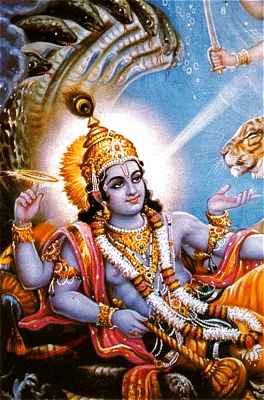 Certainly
the life of Krishna expresses the metaphysical principles that Vishnu
symbolizes. Krishna’s role in the Mahabharata is that of protector, sustainer,
and supporter of this world - as is Vishnu. But perhaps one might consider the
thought that it is simply too limiting to confine Krishna, as a man who is
fully God Realized, to any one form of the All.
Certainly
the life of Krishna expresses the metaphysical principles that Vishnu
symbolizes. Krishna’s role in the Mahabharata is that of protector, sustainer,
and supporter of this world - as is Vishnu. But perhaps one might consider the
thought that it is simply too limiting to confine Krishna, as a man who is
fully God Realized, to any one form of the All.
It is not my wish to diminish Krishna’s greatness. In fact, my goal is just the opposite. I feel that what makes Krishna win the hearts and minds of so many, is his very human accessibility. Krishna can become our friend, just as he is Arjuna’s friend. I don’t believe that Krishna and Vyasa had any intention of Krishna becoming a force that ‘belittled’ man ‘in order that deity be more and more exalted’ (The Betrayal of Krishna). Krishna tells Arjuna that God dwells in the heart of every man, woman and child - and is happy when we offer even a leaf or water as a gesture of our reverence.
The Indian scholar Krishna Chaitanya/KK Nair
It was only through the chance reading of the Indian scholar Krishna Chaitanya/KK Nair that I was able to find clarity in understanding the enigma that is Krishna. Sadly, most of the books written by Krishna Chaitanya/KK Nair are now out of print. It takes someone of enormous talent and brain power to absorb and understand centuries of ideas, both in the Sanskrit texts and in western thinking. Krishna Chaitanya/KK Nair was such a man.
In his book The Betrayal of Krishna, on which I have written extensively here at MetaphysicalMusing.com, Krishna Chaitanya gives us this brilliant insight which can be applied to any belief system:
‘That kind of devotion where it is believed that man should be more and more belittled in order that deity be more and more exalted leads to authoritarian creeds and to pathology.’
“Who is Krishna?”
In The Mahabharata, A Literary Study, Krishna Chaitanya/KK Nair poses the question - “Who is Krishna?” As you will see, he asks this question not to diminish Krishna, but rather to restore him to a fuller understanding and a far deeper meaning than that consciousness produced by any cult:
‘... to interpret the Gita, and the Mahabharata of which it is an organic part, as a cultist text is to show singular insensitiveness to poetry.’
Krishna Chaitanya/KK Nair considers poetry the superior vehicle to communicate wisdom because, unlike a theological or philosophical treatise, poetry has the capacity to recreate life in its breadth and depth and heights, life in its entire range of rich possibilities. He tells us that Vyasa was a poet with a sense of humor and suggests that in the Vision of the Cosmic Form, Vyasa ‘parades a hundred identities for Krishna, to confuse the simple-minded, but also to give some clues to the discerning.’
This esteemed scholar says that when Krishna refers to himself as Vasudeva/Vishnu (X.21), he also identifies himself with many entities such as Vasava (Indra), Shiva (chief god of the Rudras), Mount Meru, Agni the fire god, the ocean, the Himalayas, Sages Narada and Kapila, the Gandharvas (celestial musicians), the elephant Airavata, and more (X.21-40).
This list includes a horse, the god Indra’s steed Uchaisravas (X.27); and in Krishna Chaitanya/KK Nair’s words, ‘this would scarcely justify an interpretation that the Mahabharata is a text belonging to a lost cult of horse worship.’ Like J.A.B.van Buitenen, this Indian scholar points out that Krishna ‘does not identify himself exclusively with Vishnu.’
The poet Vyasa’s genius
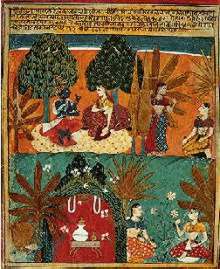 Krishna
Chaitanya is intent upon revealing how the poet-author of the Mahabharata, Vyasa, took the stories that had over time become traditions - or what we in
the west call myth - and with his enormous genius and creativity turned them
into not only what is probably the greatest epic poem ever written, but is also
the home and accessible repository of primordial wisdom and knowledge.
Krishna
Chaitanya is intent upon revealing how the poet-author of the Mahabharata, Vyasa, took the stories that had over time become traditions - or what we in
the west call myth - and with his enormous genius and creativity turned them
into not only what is probably the greatest epic poem ever written, but is also
the home and accessible repository of primordial wisdom and knowledge.
Krishna first emerges in his full glory as God Realized in man on the written pages of the Mahabharata. As far as previous written accounts of a Krishna, the scholar Krishna Chaitanya/KK Nair reports that there is a reference to a Krishna as ‘the son of Devaki’ in the Chandogya Upanishad and another reference to a Krishna who ‘slew the demon Keshi’ in the Artharva Veda. The Sanskrit grammarian Panini refers to a Vasudeva around 600 BC.
It is Vyasa’s poetry that breathes life into Krishna and brings him into being as God fully Realized in man. Under the superb genius of this mysterious poet, Krishna becomes what can only be described as a most wonderful, intriguing, brilliant, courageous, great man whose wisdom has brightened the ages ever since.
Taking the ‘cult’ factor out of Krishna does not diminish his greatness - just the opposite. Seeing Krishna with fresh eyes, in the enlightened understanding that the God-within is truly within us all and therefore accessible, close, like a best friend - can open our hearts to the liberating power of the Gita.
Krishna Chaitanya/KK Nair is quite blunt when he says that ‘it would be a comic blunder to regard him [the poet Vyasa] as a devout cultist.’
The Divine in Human Form
If Krishna was not acting within the realm of the human, if he was God on earth with absolute authority over everything, then we might assume that Krishna could have simply waved his magic wand and made all the warriors, waiting for the slaughter at Kurukshetra, love each other and forever live in peace. This miracle producing magic wand is what we all long for, but it is not the way of this world and it is not the teaching of the Bhagavad Gita.
The Supreme Self (Paramatman) veils Its Self in myriad forms of limited power and grants us autonomy from such absolutism. We have Free Will, however limited that may be, within the fabric of all others’ free will. The Creator allows us to express and experience as we choose, to embrace or reject the God within us, to reach the highest frequencies of consciousness or to make complete fools of ourselves - all so that we may have the adventure of Becoming.
Krishna Chaitanya/KK Nair tells us that ‘Vyasa rejected the stasis of the old concept of the Absolute in favor of the dynamism of embodied existence, in favor of moments of time within the stream of time that transcend time ...’ It is because Krishna is in human form that he can take an active role in the historical events that take place in the Mahabharata. Krishna works in the story as a spiritual teacher, a political advisor, an agitator who encourages the war against evil, a diplomat and ambassador who seeks a resolution between the two sides of the family, and as a friend.
Krishna took a vow not to actually fight in the war as a combatant. He serves as Arjuna’s charioteer to guide him through the battle and in the spirit of his fairness, he loans his armies to Arjuna’s enemies Dhritarashtra and Duryodhana. Each warrior was given the choice of Krishna’s armies or Krishna himself. Foolishly, Duryodhana - blinded by his anger and greed - believed he had made the superior choice. Arjuna chose Krishna, happily aware that he had chosen wisely.
Bhishma’s deathbed of arrows
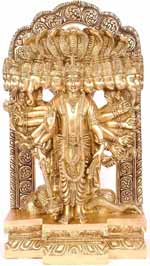 The
Vision of the Cosmic Form is not the only evidence of Krishna’s ‘superhuman dimension.’
And yet there are occasions that admit his human limitations, for example when
Krishna visits the dying Bhishma on the battlefield. The image is one of horror
and mystery. Bhishma is lying on a bed of countless arrows which Arjuna shot
into him during the battle. Bhishma was granted long ago the boon of being able
to choose the moment of his death, and he is waiting for the most propitious
time to die.
The
Vision of the Cosmic Form is not the only evidence of Krishna’s ‘superhuman dimension.’
And yet there are occasions that admit his human limitations, for example when
Krishna visits the dying Bhishma on the battlefield. The image is one of horror
and mystery. Bhishma is lying on a bed of countless arrows which Arjuna shot
into him during the battle. Bhishma was granted long ago the boon of being able
to choose the moment of his death, and he is waiting for the most propitious
time to die.
In this scene, Krishna admits that he does not have this power, as he says to Bhishma:.
‘By virtue of the boon granted to you by your father ... your death ... depends on your own will. I myself have not that merit for which you have obtained this boon.
- M.N.Dutt, Shanti Parva Ch.50.15
Krishna tells Bhishma that fifty-six days remain for the great man and the highest realms - from which one need never return - await him. Even now high above the battlefield, deities and ‘the Vasus, all having fiery forms, riding on their cars, are waiting for you [Bhishma] invisibly till the moment ...’ (M.N.Dutt, The Shanti Parva Ch.51).
Bhishma reveals that he has seen Krishna in his Divine Form. Krishna acknowledges this and says that only those who are sincere and have restrained the soul ever see this Vision. Krishna then relieves Bhishma of his bodily pain and returns clarity of mind to the old man, so that Bhishma may share his wisdom, the ‘words of truth, containing morality and profit and Yoga, to [the King] Yudhishthira’ whose ‘learning has been clouded by sorrow’ and grief from the war (Ch.51). Much of what Bhishma knows will be lost when he dies, because he is the last one on earth to know these words of truth.
The Absolute
If Krishna were the Absolute who changed all earthly events to suit perfection, would we identify with him? If all the Creator wanted was a perfect world, completely controlled and in harmony, a Free Will universe would never have been created in the first place. I feel certain there are such places of perfect harmony, and I wonder if they are not a bit dull. Certainly there is no lack of beings, obviously from their recent exponentially increasing numbers, who want to be here for better or worse!
It is Krishna’s human qualities that endear him to us and make us feel that his teachings are accessible. Later on in the Bhagavad Gita (XII.5), Krishna himself says that it is only with great difficulty that the mind of man can focus on the unmanifest (avyakta-asakta-cetasam). We need to identify and for that we need to feel something. We need to love.
‘To throw off the burden of the Earth’
Whenever the burden of the Earth becomes too great and the balance between good and evil unbearable, then the deity Vishnu incarnates to protect, sustain, and support this universe. Whenever there is too much dark, too much evil, then the forces of light and the good incarnate in human form for the well-being of the worlds. The Mahabharata states that many other celestials follow Vishnu into birth and that they can incarnate into whatever forms and lineages please them. Perhaps the heavens become a bit boring, as it is clear that they enjoy the adventure.
All the gods ... impatient to go to earth and be reborn everywhere with portions of themselves ... and so the celestials in succession descended from heaven to earth, for the destruction of the enemies of the gods and the well-being of all the worlds.
- J.A.B. van Buitenen [1(6)58-59]
Narada’s Memory
Vishnu’s incarnation as Krishna is further illuminated in a scene from the Mahabharata (Sabha Parva, Ch.36). The occasion is the ceremony to confirm Yudhishthira as ruler. The greatly esteemed sage Narada remembers ‘the words he had heard in the abode of Brahma’ regarding the Angshavatarana, meaning the incarnations of portions of every deity (M.N.Dutt, Ch.36.12). Narada is seeing the assembly at the ceremony with the eyes of knowledge that allow him to recognize the kings and warriors gathered there as ‘an assembly of the celestials.’
Narada ‘knew that the creator of every object, the exalted god of all gods, Narayana [Vishnu], who had formerly commanded the celestials’ to take birth on earth, had taken birth as Krishna.
The Death of Shishupala
At the same ceremony, Bhishma declares that Krishna is the foremost of all the men who have gathered there.
‘... Krishna was the foremost of all on earth. As the sun shines among all luminous objects, so shines Krishna among all these kings and warriors by his effulgence, strength, and prowess.’ (Ch.36.27-28)
This recognition of Krishna’s eminence among men provokes jealousy in the king Shishupala. Fueled by envy, this long time enemy of Krishna proceeds to insult him in front of the gathering. Shishupala says that the Pandavas (Arjuna, Yudhishthira, etc.) deserve to be killed for honoring Krishna as the foremost of men and that such worship of Krishna is only a form of childishness. Shishupala then says that Krishna is unworthy of worship, that he is a slave and a wretch, not a king - and deserves to be killed by Shishupala (Sabha Parva, Ch.45.3-4).
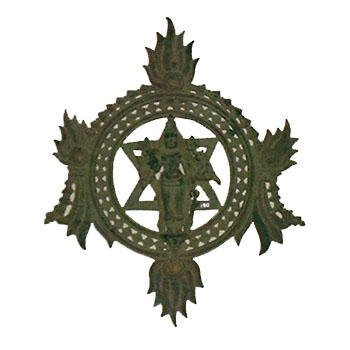
Now Krishna possesses an awesome weapon which is something like a frisbee with laser powers. This weapon is a discus named Sudarsana and it appears whenever Krishna wants it. In response to the death threat, Krishna recounts a long list of heinous crimes committed by ‘this wretch of cruel deeds’- Shishupala. Krishna then calls up Sudarsana and by the power of his mind releases the discus weapon, which steadily flies across the room straight to the neck of the one ‘who deserves to be killed’ and cuts off the head of Shishupala.
Adding to the mystery of Krishna, the subtle-body of the now decapitated and dead king enters into Krishna. ‘...[Shishupala] fell like a cliff struck by thunder. The kings saw a fearful effulgence from the body ... Issuing like that of the sun in the sky ... that effulgence ... then entered Krishna’s body ... all the kings thought the phenomenon as very wonderful (Ch.45.25-28).’
The Highlander
For those of you who are familiar with the television series ‘The Highlander’, this phenomenon will seem amusingly familiar. Whenever the Highlander cuts off the head of one of his opponents, their subtle-body enters into the Highlander’s body. This ‘addition’ effects his consciousness over time. The later stories in the Puranas say that Krishna’s mercy absorbs even his enemies, and that Krishna released any entities he killed by absorbing them into his infinite compassionate consciousness. Interestingly, the mantra of the Highlander show was - ‘There can be only one!’
This event, the killing of Shishupala by Krishna’s Sudarsana, causes a cloudless sky to pour down showers of rain, thunders to blast, and the earth itself to tremble. The gathering of men there is at first speechless, some are said to be angry, but the great Rishis were pleased and praised Krishna.
In Part Two, we will continue to discover often conflicting mysteries around the great hero of the Bhagavad Gita in hopes of answering the question “Who is Krishna?”
